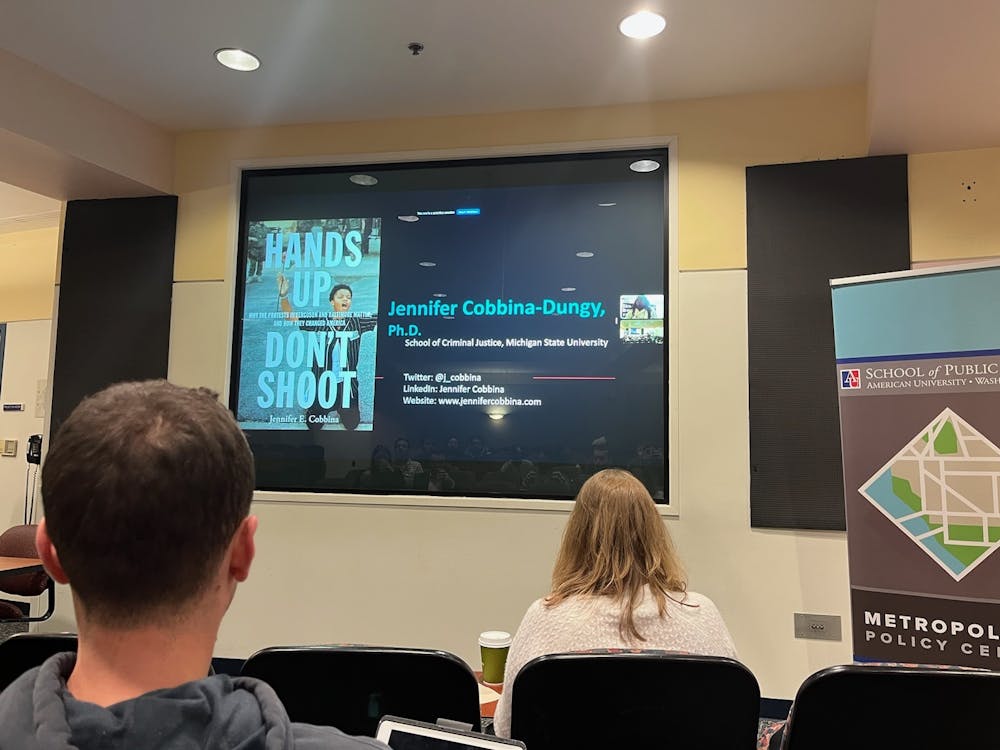Author Jennifer Cobbina discussed policy solutions for police brutality in a Nov. 17 talk hosted by American University’s Metropolitan Policy Center on her book “Hands Up, Don’t Shoot: Why the Protests in Ferguson and Baltimore Matter, and How They Changed America.”
The event was this year’s second installment of the Metropolitan Policy Center’s Urban Speaker Series. The first event was another book talk in October. “It was with Colin Gordon. He wrote a book called ‘Citizen Brown,’” said Christian Wiskur, a graduate student in the School of Public Affairs and research assistant with the Metropolitan Policy Center. He said Gordon’s research was about “policies that basically led to the black population of Ferguson not being treated like citizens, and how that led to Michael Browns murder.”
Cobbina is a professor at Michigan State University’s School of Criminal Justice. While earning her Ph.D. in criminal justice at the University of Missouri-St. Louis in 2009, a colleague invited her to interview residents of nearby Ferguson, Missouri after police fatally shot Michael Brown.
“I jumped at the opportunity,” Cobbina said at the event.
“Hands Up, Don’t Shoot,” Cobbina’s debut book, focuses on the police killings of unarmed Black men Michael Brown and Freddie Gray and the protests following their deaths. Cobbina puts special emphasis on the residents of Ferguson and Baltimore, Maryland — Brown’s and Gray’s respective hometowns. For her book, she interviewed almost 200 residents to get their views on policing and the ensuing protests in their cities.
Cobbina began her talk with an overview of the murders of Brown and Gray, before explaining two Department of Justice reports on racist policing in Ferguson and Baltimore. She then discussed her many interviews with residents and provided direct quotes about their first-hand experiences with police brutality. She said overly aggressive encounters, racial profiling, police disrespect and unfavorable treatment of women were the most frequent complaints she heard about negative police encounters during her interviews.
She then spoke about the Ferguson and Baltimore protests. She explained various motivations for protests, saying the most dedicated organizers in Ferguson would protest “even if it cost them their lives.” Although no one died at the 2009 or 2015 protests, Cobbina said a militarized police force hurled racial slurs and tear gas at protestors.
Cobbina ended her talk with a call to action for legislators, making several policy recommendations. The recommendations included boosting support services for drug abuse, joblessness and homelessness in underserved areas, and lowering the workload and scope of police responsibilities.
“What if instead of being tough on crime, we were tough on the underlying issues that criminalize people?” Cobbina asked.
Kristy Garcia, a graduate student in the School of Public Affairs, read the first four chapters of “Hands Up, Don’t Shoot” along with her classmates, who all attended the event.
“I’m really interested in policy specifically, so I think just seeing next steps is what’s most important,” Garcia said.
The event ended with a Q&A portion. When one student asked about the role police should play in a society, Cobbina said she is “a huge proponent of defunding the police,” adding that police should focus more on violent crime, while mental health clinicians should handle lower-level crime.
“Structural racism is entrenched in law enforcement,” Cobbina said. “When we break these structural systems of oppression and see the alternative vision for safety away from the hands of police and into the power of communities, I argue that we will begin to put an end to denying so many marginalized people their humanity.”





